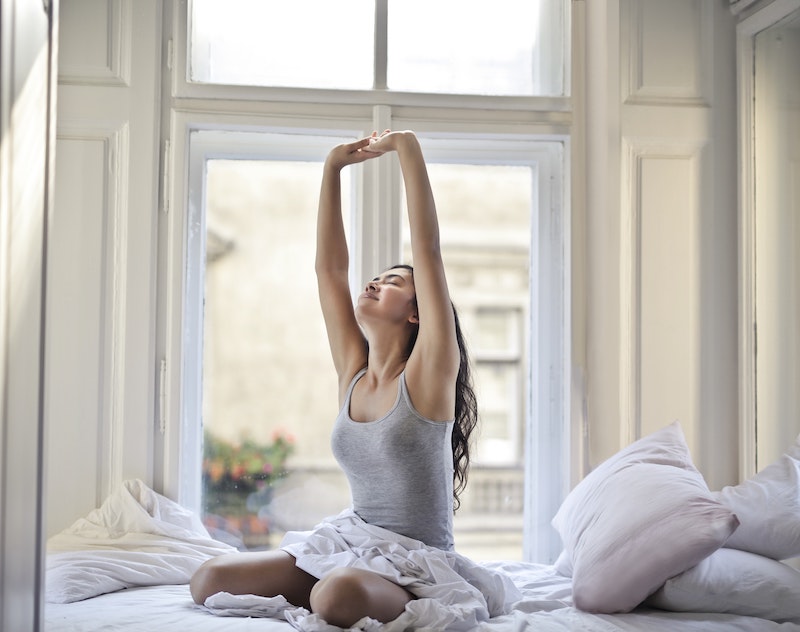
Research findings suggest that sleep detoxes the brain. Here’s how that works and how spa treatments can help people get more sleep.
The question of why we sleep is as old as humankind. Scientists have been exploring it for decades, but it’s still a difficult one to answer. We know we need sleep to survive, that we feel better after we do it, and we can barely function when we don’t get enough of it. We know we dream during sleep and appear to solve problems and solidify learning, and more than a century of research has established the fact that sleep benefits the retention of memory.
Sleep detoxes the brain
We also may be detoxing our brains when we sleep.
A 2013 study using mice showed that the space between brain cells may increase during sleep, allowing the brain to flush out toxins that build up during waking hours. According to a brief, the results suggested a new role for sleep in health and disease.
“Sleep changes the cellular structure of the brain. It appears to be a completely different state,” said Maiken Nedergaard, a leader of the study.
The study showed that during sleep a plumbing system called the glymphatic system may open, letting fluid flow rapidly through the brain. The glymphatic system helps control the flow of cerebrospinal fluid (CSF), a clear liquid surrounding the brain and spinal cord. Previous research findings suggest that toxic molecules involved in neurodegenerative disorders accumulate in the space between brain cells.
“It’s as if Dr. Nedergaard and her colleagues have uncovered a network of hidden caves and these exciting results highlight the potential importance of the network in normal brain function,” said Roderick Corriveau, Ph.D., a program director at NINDS.
The results were said to potentially have broad implications for multiple neurological disorders and highlight the importance of sleep.
“We need sleep. It cleans up the brain,” said Dr. Nedergaard.
We also know we need sleep because a lack of it can lead to a host of negative health outcomes. According to the Cleveland Clinic, “some of the most serious potential problems associated with chronic sleep deprivation are high blood pressure, diabetes, heart attack, heart failure or stroke.” Other potential problems include obesity, depression, and reduced immune system function.
Fortunately, spa treatments, including massage, sauna, and taking warm waters can help improve sleep function – something to communicate to your guests.
Some findings regarding common spa treatments and sleep:
Massage
Postmenopausal women with insomnia undergoing massage therapy experienced improvement in sleep patterns. Patients self reported falling asleep faster, improved quality of sleep, and feeling better upon waking.
Women undergoing massage therapy also experienced a significant decrease in depression, insomnia, and increased quality of life.
In addition to a decrease in long-term pain, subjects receiving massage experienced improved sleep and an increase in serotonin levels. Results were based on twice-weekly, 30-minute massages for 5 weeks.
Sauna
Volunteers who took a sauna before bed experienced a significantly increased state of relaxation and improved levels of deep sleep than on nights they did not take a sauna before bed.
83.5% of 482 respondents to a survey in another study reported sleep benefits after sauna use.
Soaking in warm water
Bathing one to two hours — ideally, 90 minutes — before bed in water at 104 to 109°F (40 to 43°C) helps people get the best quality sleep and to fall asleep an average of 10 minutes faster than normal.
More recent research also found that 7 in 10 Americans do not achieve restorative sleep.
Many hotels and spas are seeing the potential market here and are creating programs designed to help guests sleep better. These include the Four Seasons Hotel St Louis where the Deep Sleep Restorative Massage with calming aromas of lavender and chamomile concludes with a 20-minute nap under a weighted blanket while delta wave-stimulating melodies play in the background (via Well+Good). Guests are given a pillow mist and eucalyptus salt soak to continue the experience in their rooms, which feature blackout curtains, soundproof windows, and signature Four Seasons mattresses featuring AirCool technology, and crisp linens.
And the Fairmont Century Plaza offers treatments targeting sleep at a cellular level through a combination of infrared technology, compression therapy, and healing sound waves on an anti-gravity bed. Guest rooms feature black-out curtains and plush pillow top mattresses.
Langham Hospitality Group, meanwhile, recently launched Sleep Matters by Chuan, a comprehensive global sleep wellness programme developed in conjunction with the World Sleep Society.
Amy Chan, Assistant Group Director of Spa & Wellness at Langham Hospitality Group, told us, “As sleep plays a vital role in a memorable travel experience, helping travelers enjoy a good night’s rest allows for greater enjoyment of a holiday, higher productivity on a business trip, and is the connective element between a hotel and its guests.”
Exclusive elements include a magazine curated by the World Sleep Society as well as elements based around wellness rituals and offerings from Langham Hospitality Group’s global spa and wellness brand, Chuan Spa.
Every Langham hotel around the world has embraced the program and is offering their own packages and local elements to help guests achieve better rest.
Spa Executive is published by Book4Time, the leader in guest management, revenue and mobile solutions for the most exclusive spas, hotels, and resorts around the globe. Learn more at book4time.com



